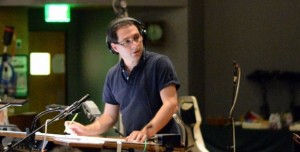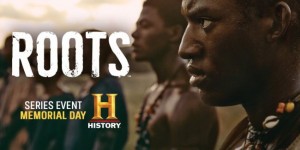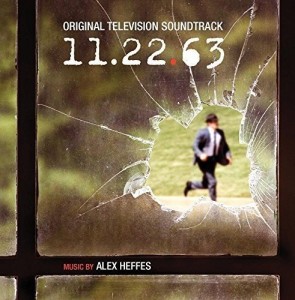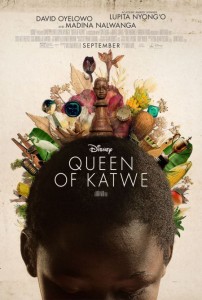
ROOTS composer Alex Heffes | ©2016 Alex Heffes
For a United Kingdom native with such diverse scores as ESCAPE PLAN, STATE OF PLAY, TOUCHING THE VOID and DEAR FRANKIE under his English language belt, Alex Heffes has likely traversed the musical continent of Africa more than any of his peers. Beginning his explorations with a harrowing escape from Uganda in THE LAST KING OF SCOTLAND, Heffes took an emotional journey of education alongside THE FIRST GRADER, then brought moving importance to the continent’s greatest leader in MANDELA: THE LONG WALK TO FREEDOM. Later this year, he’ll even be showing determined woman self worth through the game of chess when Heffes makes a full circle back to a far more stable Uganda in the forthcoming QUEEN OF KATWE.
Now the composer’s impressive way of capturing Africa’s rhythmic cultures will literally seize its people, and one man in particular, for a new TV take on ROOTS. Author Alex Haley’s ancestor Kunta Kinte first arrived on ABC’s shores in 1977, the telling of his family history turned into a smash hit miniseries that truly created “event” television. Feeling that any great tale is worth repeating to a new generation, these newly burnished ROOTS arrive on Memorial Day to air over four consecutive nights on multiple cable networks. Given a similarly massive, star filled cast, and overseen by multiple, acclaimed directors, it’s up to Alex Heffes to become a vital chain in spanning slavery to freedom. Heffes’ impressively accomplishes this mighty task with a score that starts out with all the pride of a continent, only to be seized into a terrifying, musically modernistic world of sampling and percussion. But hope lives in the playful guitar and warm, western-styled melody of captives determined to find their own personal freedom in a strange, brutal land, creating lyrical family bonds as strong as their harsh physical shackles – the breadth of Heffes’ score movingly culminating as the worlds of Africa and America merge to give birth to a culture, and people that would reshape the country’s music itself. Indeed, ROOTS has never quite sounded this real, with all of the punishment and spirituality that Heffes has been able to capture in body and soul with his impressive, time and continent spanning work.

ROOTS | ©2016 The History Channel
ASSIGNMENT X: What do you think gives you a particular affinity for African scores, and how important was it to be authentic in the process, especially given a remake of a landmark ABC miniseries?
ALEX HEFFES: I think I have always been color blind with music (and people I hope). Meaning, it’s all good to me. I’ve never felt like one type of music from one place or time is any higher form of art than another. I remember when I was very young being really drawn to African music just as much as loving a Mahler symphony or a melody by Puccini (still the Don of a good tune!). I didn’t think that was strange at all. Actually, looking back on it my teachers were a little puzzled by that attitude, I think. Back then things were very much more compartmentalized. Music was really taught in very classical-centric way. Even at university my ‘modern’ music history was only taught up to about 1911. However, my school years coincided with the explosion in recordings available on LP and then CD. So I collected whatever I could get my hands on. It was an exciting time. You could feel in the early 80’s that there was a lot of music starting to become available that had never been easily found before. And that’s all before the internet kids! If YouTube had been invented then it may just have blown my mind!
But to answer your question about authenticity – I’ll put it like this: We are making a movie, so it’s inherently inauthentic in a sense. I think there are two main choices: score your film with really authentic needle-drop tracks that are the real deal, or score it with new music that captures the spirit and essence of the story you are trying to tell. Yes, you could take as a starting points some authentic performers or style of music but that’s not always the rule. In some cases using music that is really ‘inauthentic’ can also be really powerful. Nobody would argue the score to “The Mission” is musically ‘authentic’ in the film but it does something really amazing for the picture. In the case of “Roots,” I’ve tried to steer a course of using real vocalists and instruments from Gambia as part of my palette, but also to not feel constrained by that. I felt it was important for the music to also feel modern and punchy in places. This version of ROOTS needs to speak to a very different audience than the original. I wanted the music to be able to transcend being a ‘travelogue’ or a piece of history. It has to make the characters seem like real people that the audience could imagine meeting and understanding. It seems to me that if ROOTS can do anything, it is to have the audience re-think the definition of people as ‘slaves’ and take a step back to understanding that these were ordinary people leading regular lives before they were defined as slaves. However music can help with a genuine emotional connection to the characters, which is what I always go for.
AX: Did you go back to watch the original miniseries or listen to the score by Quincy Jones and Gerald Fried before taking on its remake?
HEFFES: No. I thought it would be best to totally steer clear.
AX: Given that there have been a number of iconic “African” scores like THE LION KING, how did you want ROOTS to establish its own identity in the genre?
HEFFES: Well, there are no lions in ROOTS (I don’t think Gambia actually has any lions sadly!). I wrote a theme that you hear in all four nights that is transformed through the generations. That’s the backbone of the score’s musical identity. I also tried to use the African parts of the palette in a way that is not expected, mixing it with synths and other elements so that it’s not just trying to sound ‘authentically’ African. As I said before, I’m trying to give the audience a connection with the characters and what they are feeling. For example, when Kunta Kinte first arrives in America, we wanted if it seem like he had almost been taken in a spaceship and landed on another planet. Everything is foreign to him – the language, the color of the people, the fact that every African person has been made a slave. The music tries to give his sense of alienation and disorientation by using a strange hybrid of African elements mixed with synths, electric cello and other slightly “unplaceable” sounds.
AX: What’s the particular challenge of scoring a miniseries with so many interlocking characters, especially given one with the iconic reputation of ROOTS?
HEFFES: In a way it makes it easier. Lots of different characters give you something to hang your hat on musically. There’s Kunta who is the Mandinka Warrior, “Chicken George” who has a southern banjo thing going on, the crazed slave owner Tom Lee, who has something slightly unhinged about him. These are all really strong places to start from musically.
AX: What were your own explorations into African music like in ROOTS, and what particular wind and percussion instruments became important to this score?
HEFFES: The story starts in Gambia where Kunta is born. So I did some recording remotely in Gambia with vocals and instruments. Sona Jobarteh sang and also played the Kora. Sona comes from an incredible lineage of Griot musicians (storytellers, poets, musicians) in Gambia. Her Grandfather was the Master Griot of his generation, Amadu Bansang Jobarteh. We also recorded school children from the Amadu Bansang Jobarteh School Of Music in Gambia, which comprises children from surrounding villages. I used a wide variety of African flutes and of course percussion, as well as all the traditional drums. I recorded a lot of mbiras (thumb pianos) and other tuned percussion myself. We also did vocals in London along with the orchestra that was recorded by Peter Cobbin at AIR studios. So it’s been a very international endeavor.
AX: What was the musical importance of Kunta Kinte?
HEFFES: Kunta is wonderfully played by Malachi Kirby. It’s a very strong, quiet and internal performance. So in a way he has less music than you might imagine. I think the main ROOTS theme is more of a comment on his situation rather than his character’s actual theme.
AX: It takes quite a while for more conventionally pleasing melody to enter the score. Was it important to create that harsh sense of being thrown into a punishing world for Kunta Kinte?
HEFFES: The idea is that the music is more traditional and centered around really authentic Gambian music in the beginning, using source tracks (also, some of the early part of Night 1 was scored in South Africa by Philip Miller using African musicians.) As Kunta is captured and taken to America the score starts to become more movie-like. That sense of alienation and harshness is certainly a strong element of the music in the early parts. But as tough as some of these early scenes are to watch – and they really are – it was always important to leave the door open to hope. So music can occasionally give you that glimpse of something brighter inside the mind of Kunta.

ROOTS | ©2016 The History Channel
AX: How did you want Chicken George to introduce southern music into the score, as well as a sound that was more “movie score”-ish as opposed to African?
HEFFES: George is two generations down from Kunta so he only knows America as his home. All the characters after Kunta only have a residual memory of Africa without ever having been there. It was fun doing George. He is the fast-talking chicken fighting gambler of the family. I tried to give him something fun with banjos and washboard but also throwing in some sneaky djembes too to give that off screen African echo.
AX: How did you want the score to reflect the passage of time and regions, especially in relation to the black experience in America that goes from slavery to freedom?
HEFFES: The further away the story gets from Africa the more the palette opens up to strings and other colors. There is the Civil War section in the last night which has a blend of the snare drums and brass you might expect but with wooden anklungs and African percussion give it a slightly off-kilter feel. After the Emancipation proclamation one of the first things the characters are free to do is acknowledge their African heritage for the first time, so the score finally manages to come full circle to it’s African roots for the finale.
AX: How did you want to integrate the western symphonic approach into the African music here?
HEFFES: That’s always an interesting conundrum as African music (whatever that is – it’s a huge continent!) is not really harmonic. It’s driven by single lines and rhythm. So trying to translate that into something that an orchestra can add to without sounding out of place is an interesting task. I think I’ve reserved orchestra for the more thematic moments. A good tune still sings on an orchestra.
AX: Talk about the vocal performances in the ROOTS score.
HEFFES: We have some great vocal performances, as I mentioned from Sona Jobarteh and Sheriffo Kanuteh in Gambia. Lincoln Jean-Marie also provided a lot of vocals from London. He is fantastic. The kids from the Amadu Bansang Jobarteh School make me smile whenever I hear them in Night 2.
AX: There’s a suspenseful, synth-sample propulsion darkness to ROOTS as well that brings to mind your score for ESCAPE PLAN. In that way, do you see ROOTS as a prison break out score as well as the characters try to figure a way out of both their physical and mental chains?
HEFFES: Certainly when Kunta tries to escape in Night 1 it’s pretty full on dark and pounding. I think that’s how you would feel inside being chased by dogs across sugar cane fields for your life. As I said, I’m more interested in how the audience should feel rather than what instruments might be historically accurate for a scene. In some of those scenes, I processed the African percussion to make it a little more synthy, to make it impossibly tight and punchy and give it some edge. I’m a fan of re-amping drums and putting them guitar pedals to give them some dirt. So there is some of that in Night 1 for sure.
AX: Given that four separate directors (Bruce Beresford, Thomas Carter, Phillip Noyce and Mario Van Peebles), made ROOTS, how important was a musical sense of continuity? Or was there a guiding, creative person through the process?
HEFFES: That was an interesting part of the challenge. There are four great directors all with very different styles and different films. So the music really had to adapt to each one while keeping a senses of continuity. I guess that comes from thematic ideas that can be shared between nights but with radically different treatment.
AX: Television has a particular breakneck pace. What kind of challenges did that add to scoring ROOTS, especially given how much music you’d need to compose for it, not to mention that you weren’t scoring the show in chronological order?
HEFFES: The schedules for films can be crazy, but TV is a whole other level of madness. I think I wrote close to 5 hours of music in a pretty short amount of time. Need I say more?
AX: Your other recent miniseries is for the Stephen King adaptation 11.22.63. Could you talk about the challenge of scoring time travel, especially given that this was Hulu’s first, ambitious project in long form television?

11.22.63 Soundtrack | ©2016 Water Tower Music
HEFFES: 11.22.63 is very different to ROOTS! That’s one of the things I love about being a composer the most. The show is very ambitious and I think it’s come out fantastically well. The writing is amazing and it has some of the best acting performances I’ve scene in a very long time. It has that Stephen King/JJ Abrams hook to it – as soon as your start watching you just get hooked on the premise. The thing I particularly like about 11.22.63 is that although on the face of it you are watching a time travel show about stopping the assignation of JFK it really turns out to be much more. Going back in time is really a way for the James Franco character to reassess his life and start living again with a blank slate to try and get it right. He meets Sadie and their relationship really turns out to the be the center of gravity of the show. That final episode is really heartbreaking! I was very happy with how Sadie’s theme turned out.
AX: You wrote a powerful, propulsive score to the Lance Armstrong film THE PROGRAM. What was the challenge of playing a man who at first appears to be an American hero who then takes a major fall from grace, putting those very ideals into doubt along with him?
HEFFES: It’s a challenge to write music about someone that has such a mixed history. Stephen Frears is a truly wonderful director, and his main direction to me – as the master filmmaker he is – was to say very little. He let me react to the film without temping it too much. Actually I wrote a lot of music to the rough cut and they edited many scenes to the music and then I would go back and re-score the scenes again. We had a great time at throwing it back and forward to each other. My initial idea, which stuck through the film, was to find that motor inside of his head that just keeps on turning. As it’s about bikes I knew it shouldn’t be too mechanized in it’s sound. So I recorded a lot of electric cello and processed and looped it so it has a sort of mechanical motor quality while still sounding like it came from a human. I also sampled a bike being hit and strummed. We even slapped bike tires against the garage walls to make drum sounds. A lot of the percussion in the film comes from these sounds. It’s amazing how many pitches you can get out of the spokes of a bike wheel actually!
HEFFES: Next up you’ve scored the Idris Elba action film BASTILLE DAY, where he’s a cop trying to thwart a terrorist attack in France. Could you talk about that score, and how these kinds of action scores are now becoming fact – minus the happy ending where these plots get thwarted?
HEFFES: Yes, this is very different again. BASTILLE DAY is a great Friday night kick-back-and enjoy fun movie. I watched it with a test audience here in LA and the amount of noise they made was incredible! They just love Idris and were cheering with him all the way! The score is much less orchestral than something like THE PROGRAM. It’s pretty gritty. LOTS of synth programming plus me hitting or bowing just about anything I could get my hands in in my studio. It has a really great rooftop chase in Paris. I scored some of it by whacking an out of tune autoharp with chopsticks… What a way to earn a living.

THE QUEEN OF KATWE | ©2016 Walt Disney Pictures
AX: You’ll once again be returning to Africa’s music this September with your score for Mira Nair’s QUEEN OF KATWE, which is about a Ugandan girl who tries to become a chess champion. What’s will the challenge of that score be, especially given that it’s also about a cerebral sport?
HEFFES: Although chess is cerebral this film is all heart. It’s just lovely. It’s really about overcoming bad odds in life and achieving more than you thought possible. Mira is a really great director and knows just how to strike a balance between authored individual filmmaking and something that is also really commercial and speaks to a wide audience. It’s a really interesting film for Disney to have made. It has a great cast and really strikes a balance between great performances from Lupita Nyong’o and David Oyelowo and the unknown Ugandan children actors in the film who are all brilliant. It’s a very thematic and gentle score that is a more orchestral than something like “Roots,” although it’s set in Africa. It’s a really universal story. There are plenty of authentic Ugandan needle drop tracks in the film to set the scene so the score could concentrate more on the music story telling. I am very fond of it.
AX: Do you hope that ROOTS has the same kind of impact on today’s television audience? And what kind of lessons do you hope the musical helps impart on the audience?
HEFFES: I really do. I’m so proud to be a part of ROOTS. I hope it makes an impact. It tells a story that is so vital in understanding modern America. It’s not a tough navel gazing experience though. It’s modern and relevant, yes, but it’s more than just an important historical document about the African American experience – it’s also a great story and quite a ride!
ROOTS premieres on Monday, Memorial Day (Monday, May 30th) and will air over four consecutive nights on The History Channel, A&E and Lifetime. Alex Heffes’ score for “Roots” will be released by on CD
Buy Alex Heffes’ score for “11.22.63” HERE
Buy Alex Heffes’ score for “The Program” HERE
Buy Alex Heffes’ score for “Bastille Day” HERE
Visit Alex Heffes’ website HERE
Follow us on Twitter at ASSIGNMENT X
Like us on Facebook at ASSIGNMENT X
Article Source: Assignment X
Article: Interview: ROOTS composer Alex Heffes
Related Posts:











